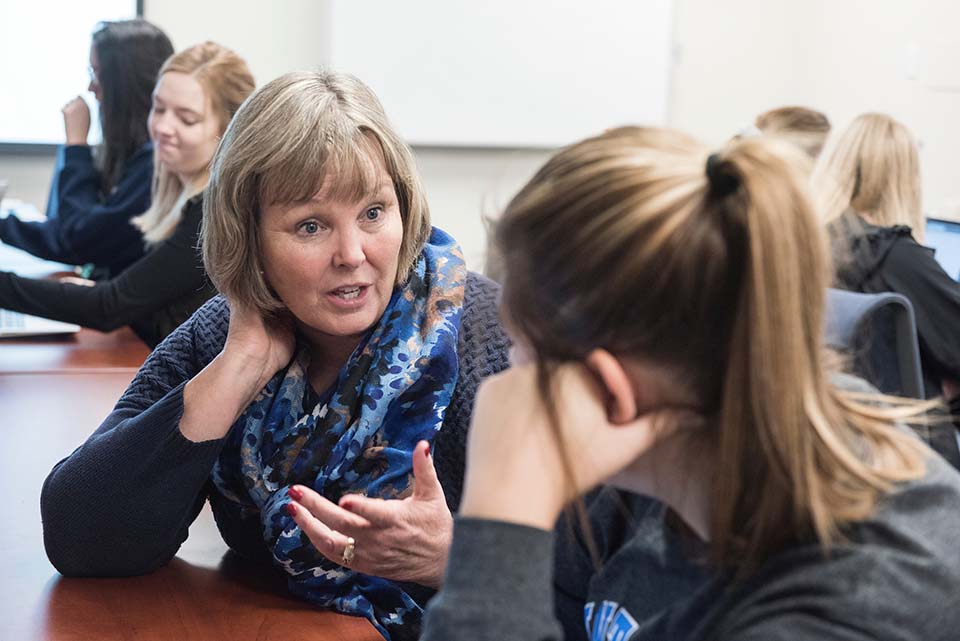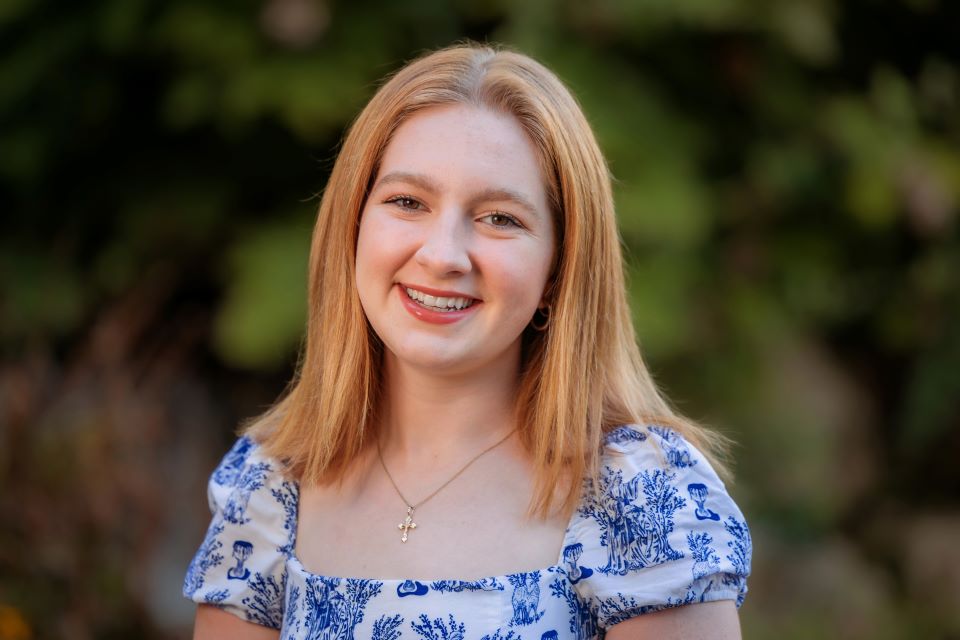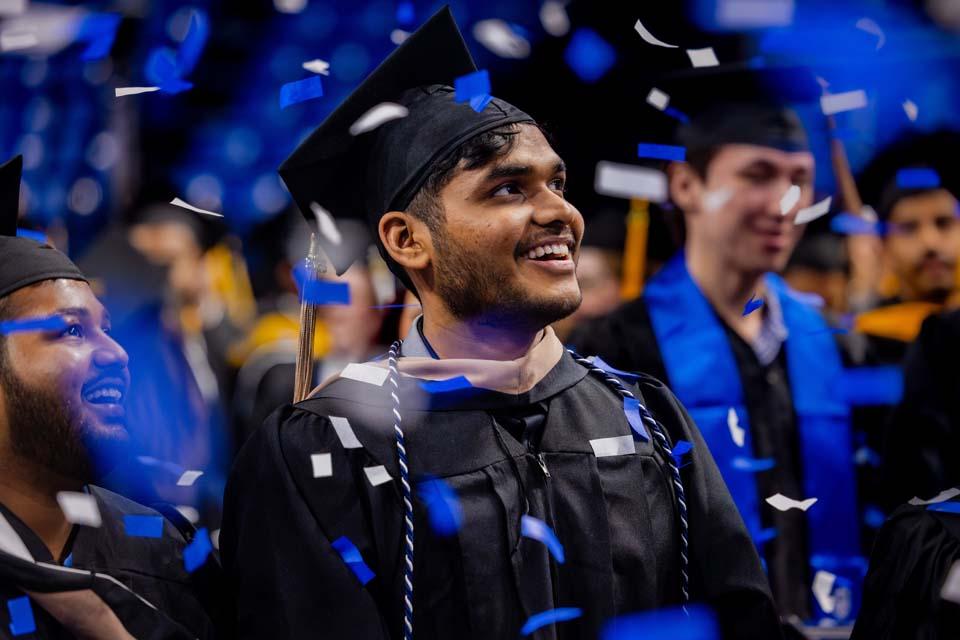Students Honor Generosity of Donors Who Gave Their Bodies to Support Medical Education
ST. LOUIS — The foundation of medical care is critically dependent upon the anatomical knowledge students acquire early in their training from laboratory cadaveric dissection, said John R. Martin, III, Ph.D., professor of anatomy and the director of the Gift Body Program at Saint Louis University.
Between Oct. 1, 2022, and Sept. 30, 2023, 371 individuals generously donated their bodies to SLU’s School of Medicine to train future physicians, occupational and physical therapists, athletic trainers, physician assistants, and educators.
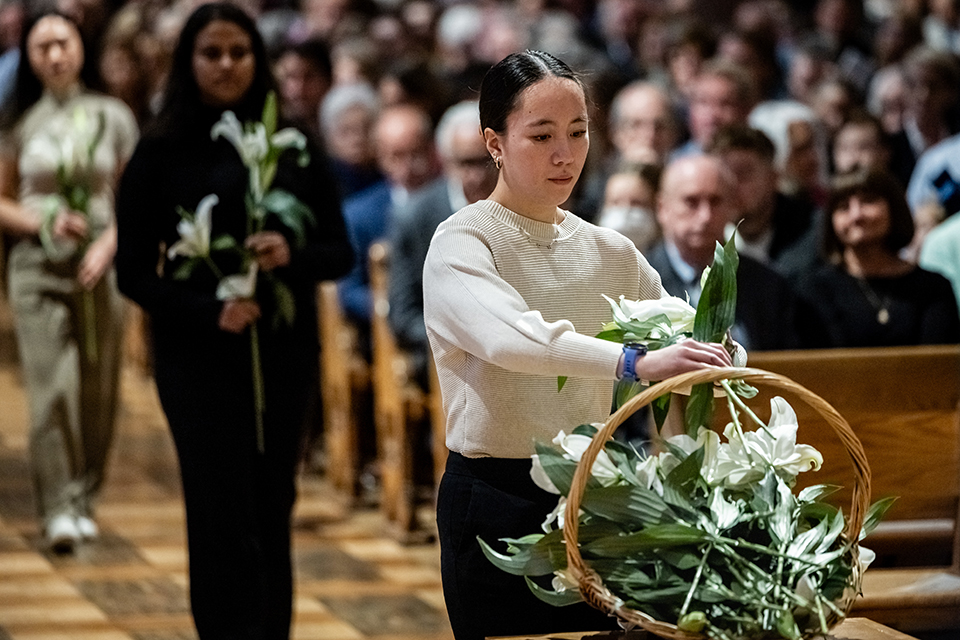
Members of the 2027 School of Medicine class offer flowers during the Interfaith Memorial Service to honor gift body donors and their families at Saint Francis Xavier College Church on Friday, Nov. 10, 2023. Photo by Sarah Conroy.
An annual Interfaith Gift Body Memorial Service was held at Saint Francis Xavier College Church on Friday, Nov. 10, to honor the donors’ selfless gifts. The service was led by first-year medical students of the Class of 2027, with support from Campus Ministry and SLU’s Center for Anatomical Science and Education (CASE).
Students remembered donors through prayers, musical performances, and personal reflections on how their study of a donor's body has impacted their learning experiences. Students placed white lilies in a basket containing the names of the donors. These flowers symbolize the student's gift back to the donors.
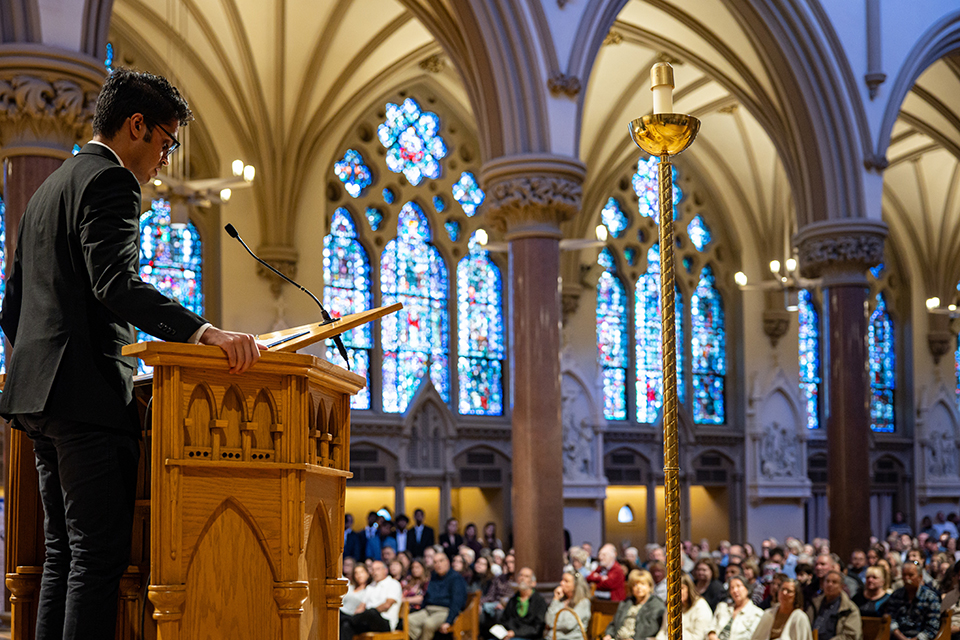
Medical student Abhinav Rajasekhar shares a reflection during the Interfaith Memorial Service to honor gift body donors and their families at Saint Francis Xavier College Church on Friday, Nov. 10, 2023. Photo by Sarah Conroy.
In his reflection, Abhinav Rajasekhar said the feeling of unease and heaviness he initially experienced entering the anatomy lab and encountering donors eventually gave way to a sense of reassurance.
"As first-year medical students, we are sometimes thrown into the deep end of the pool with hundreds of new terms and concepts each week," Rajasekhar said. "It is a challenge to make sense of everything, and seemingly impossible to see how everything we learn connects. However, when I am in the lab, that fog in my mind slowly begins to subside."
By spending time with the donors, Rajasekhar gradually began to see how all the puzzle pieces of what he had learned fell into place. More than any textbook, diagram on PowerPoint slides, or set of Anki flashcards, he said the donor's body aided his studying the most.
Lizzie Reschenberg echoed these sentiments in her reflection. Reschenberg found it easier to share her knowledge of gross anatomy with others as a teacher’s assistant and feels confident in her ability to serve future patients. She said that hearing the material in a lecture isn't the same as seeing it.
"Hearing how the aorta arises from the left ventricle, then arches superiorly and continues inferiorly, all while giving off arterial branches to supply the lungs, digestive system, and extremities seemed theoretical," Reschenberg said. "But when I saw the common carotid and subclavian arteries branch from the aorta for the first time and extend to the head and arm, respectively, the intricacies of the human body were revealed to me."
In their reflections, students emphasized that donors are more than a collection of skin and bone, organs, nerves, and ligaments they traced and tried to understand and memorize. They each had a story, a life journey that was special and sacred.
A graveside service is conducted by the medical school campus minister and attended by CASE faculty and staff who bury the ashes at Sts. Peter and Paul Cemetery, 7030 Gravois Ave, twice a year.
There is one common grave marker at the site with the following inscription: “Saint Louis University and its students gratefully acknowledge the charity of those buried here who gave their remains for the advancement of medical science.”
Those interested in learning more about the Gift Body Program can call 314-977-8027.
Latest Newslink
- Kathryn Mitchell Pierce, Ph.D.: 1955-2025Kathryn Mitchell Pierce, Ph.D., associate professor of educational studies, died Wednesday, Dec. 10, 2025. She was 70 years old. Pierce joined Saint Louis University in 2015 as an assistant professor in the School of Education. Initially a literacy specialist in the undergraduate program, she eventually taught and mentored across all levels at the School of Education. She became an associate professor in 2022.
- Saint Louis University Student Speaks About Leadership and Disability at Ignatian Family Teach-In for JusticeSaint Louis University senior Grace LoPiccolo shared her personal leadership journey at the 2025 Ignatian Family Teach-In for Justice. The event, held annually in Washington, D.C., is the nation’s largest Catholic social justice advocacy day.
- SLU Research Shows Surge in Alcohol-Related Liver Disease Driving ‘Deaths of Despair’Researchers at Saint Louis University School of Medicine say deaths from alcohol-related liver disease have surged in recent years, and the increase is hitting people without a college degree the hardest. While nearly every demographic group is seeing higher death rates—including those with college degrees—the gap between economically disadvantaged groups and more affluent ones is growing, according to new research.
- Saint Louis University Joins Multi-Disciplinary Research Team to Enhance Stress Resilience in SorghumSaint Louis University is part of a multi-disciplinary team, led by the Donald Danforth Plant Science Center, to deepen the understanding of sorghum, a versatile bioenergy crop, and its response to environmental challenges.The U.S. Department of Energy (DOE) Biological and Environmental Research (BER) program supports the three-year $2.5 million project for Genomics-Enabled Understanding and Advancing Knowledge on Plant Gene Function. Saint Louis University will receive $437,039 for its portion of the study.
- SLU Graduates Celebrated at Midyear CommencementSaint Louis University celebrated its Midyear Commencement on Saturday, Dec. 13, inside Chaifetz Arena. More than 1,900 guests watched as 600-plus SLU students walked across the stage and left as graduates.
- Why Do Raccoons Cross the Road? SLU, St. Louis Zoo Research Shows They Don'tA new study led by researchers from Saint Louis University, the Saint Louis Zoo, and partner organizations set out to understand how raccoons use space in one of the nation's largest urban parks.








